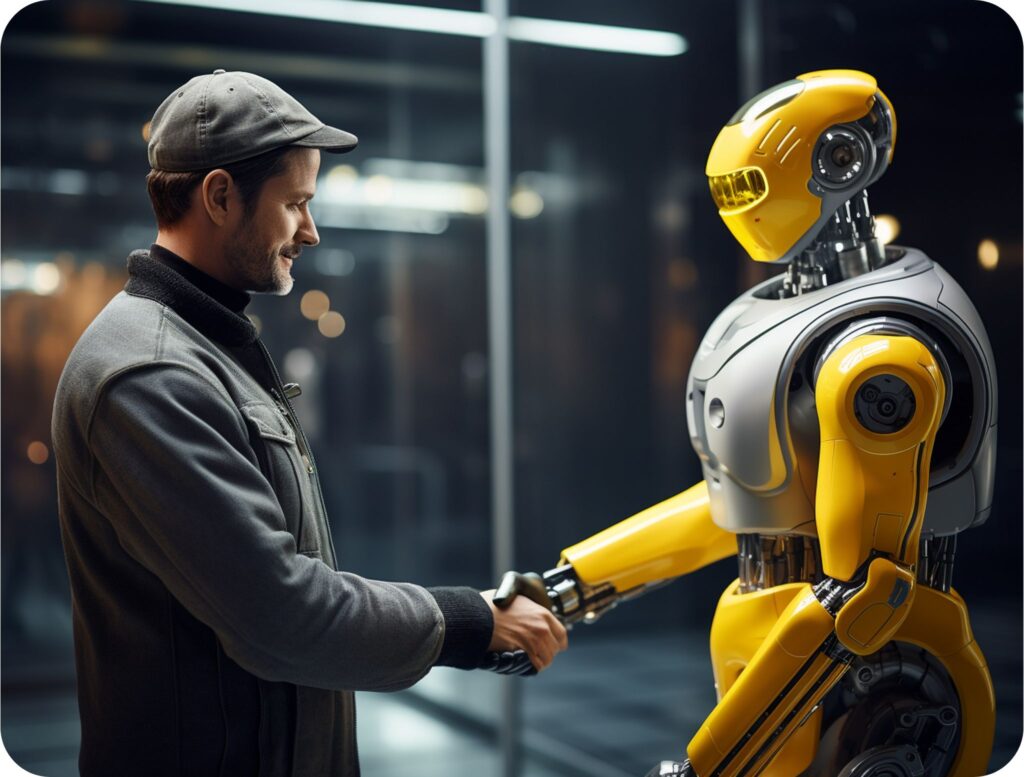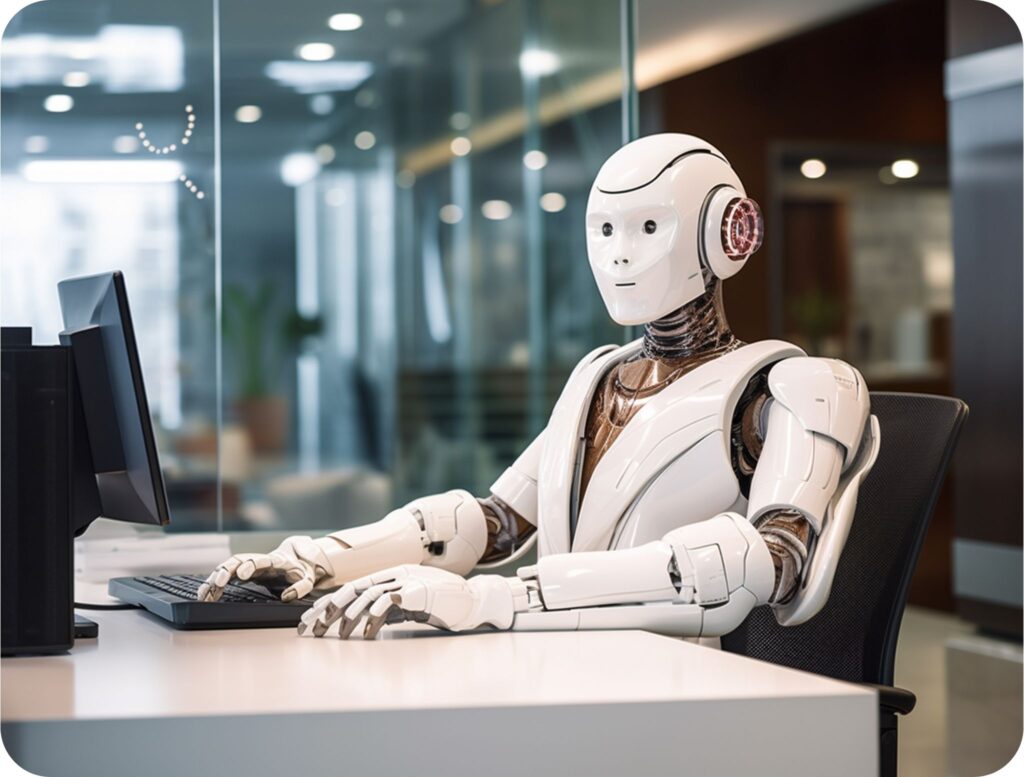As technology advances, human AI collaboration is not just a future possibility but an imminent one.
Imagine a future in which human AI interaction does not just affect a few sectors but all the sectors of our lives. Whether it is the healthcare sector, education sector, or marketing and sales, AI will affect everyone. Continue reading to learn about the 10 ways AI and humans working together can be beneficial.

10 Ways Human AI Collaboration Can Work Together
The following are the ways by which AI and humans can work in collaboration with each other:
Healthcare and Diagnosis
In healthcare, where urgent diagnosis and treatment are necessary, AI collaboration can be of genuine assistance. By 2030, AI in healthcare is predicted to reach $187.95 billion. How does human AI collaboration prove to be beneficial in healthcare? The following pointers answer this question:
- AI has helped in imaging and diagnosing rapidly and accurately.
- It has helped provide personalized treatment insights, allowing medical experts to apply their clinical knowledge and make the final decision.
- It has helped monitor and take care of the patient.
Learning and Education
The evolution of human and AI collaboration has paved the path for future learning. The following are the ways by which human AI collaboration has proved to be beneficial in the learning and education sector:
- AI has helped in creating learning that is more personalized for the students.
- It has helped teachers save their time.
- It has proven to boost students’ engagement in the classroom.
- It has allowed educators to test students’ knowledge based on assessments and tests.
- It will enable the teachers to provide prompt feedback to the students.
Innovation in Marketing and Sales
With AI affecting every sector of our lives, the marketing and sales sector is also influenced by it. 74% of marketers will use AI in the upcoming 5 years to do most of their tasks. Human AI collaboration in marketing and sales can result in:
- Targeted marketing via AI data analysis to reach a larger base audience.
- Creative campaign development
- For better customer engagement
Language Translation and Interpretation
AI-based translation tools have made headway in shattering language barriers. The context, tone, and nuances of human languages require human touch. AI human collaboration in language translation and interpretation resulted in:
- Quick and automated translation of language.
- Faster processing times
- Improved cultural understanding
- Broadened communication reach
Automation of Routine Tasks
AI comes with a significant advantage. It possesses the capacity to automate repetitive and mundane tasks. Humans can now focus on more complex and creative work. AI human collaboration in routine tasks such as:
- Data entry automation
- Scheduling optimization
- Customer service support
- Inventory management assistance

Personalization and Customer Service
AI’s unique ability to manage vast data sets makes delivering highly personalized experiences in customer service, marketing, and product recommendations possible. Human or AI collaborate in customer service which resulted in:
- Personalized recommendations
- Quicker response times
- 24/7 service availability
- Personalized customer interactions
- Improved issue resolution
Safety and Security
AI is increasingly employed to improve safety and security in both physical and digital fields. It detects cyber threats to identify potential risks. It responds faster than humans. Human or AI can collaborate in this by:
- AI monitors potential security breaches.
- Humans evaluate risks flagged by AI and decide on a course of action.
Scientific Discovery
AI speeds up scientific discovery. It does this by handling large datasets. These datasets would take humans much longer to analyze. AI and humans collaborate in this by:
- AI quickly identifies patterns and recognizes potential breakthroughs. Researchers use AI insights to help formulate hypotheses, design experiments, and interpret results.
- AI automates parts of experimentation. It also monitors lab conditions.
Optimizing Supply Chain and Logistics
Two of today’s most significant fields that benefit from AI include supply chain management and logistics. In this context, using AI technologies, companies can build demand forecasts, which will minimize expenses. In the same breath, they improve the speed of delivery. AI human collaboration results in:
- Optimized route planning
- Reduced operational costs
- Enhanced demand forecasting
- Real-time tracking
- Improved inventory management
Predictive Analytics and Decision Support
Several trends specific to predictive analytics powered by AI result in enhancing business decisions. AI is capable of working through large amounts of data. Thus, AI predicts trends. Subsequently, people arrive, interpret the results, and or make further decisions based on the conclusions given by AI. The following are the benefits of AI and humans working in predictive analytics:
- Data-driven insights
- Improved risk management
- Enhanced decision-making
- Optimized resource allocation
- Proactive problem solving
FAQs
Who controls AI?
AI is controlled by organizations, developers, and governments. They create AI trains and regulate them. Ultimately, humans set rules, and the parameters guide AI behavior. They ensure responsible use.
What is the future of human-AI collaboration?
Expectation. Human-AI collaboration grows. AI manages repetitive tasks and processes data. Humans focus on creativity, strategy, and emotional intelligence. The scenario enhances productivity and is applicable across industries.
How can AI help humans in the workplace?
AI can perform functions of data entry, data sophistication, and data interpretation. It can also enhance decision making. It can also enhance the making of good decisions. This is because, through AI, human beings concentrate only on complex assignments, which entail creativity and planning.
Will AI replace human jobs?
It is most likely that many jobs that require repetitive functions are the ones to be affected by AI. It will also generate new positions. These are in AI governance, creation, and partnership. Health information organizations need human supervision and creativity.
What are the benefits of human-AI collaboration?
The integration of human and AI increases efficiency and effectiveness, as it helps in making better decisions and contribute to innovation. AI deals with ordinary tasks relying on assumptions while humans turn to more profound tasks.
What are the challenges of working with AI?
AI has limitations in understanding context. Human oversight is necessary. It cannot think out of the box like humans can.
What skills will humans need to work with AI?
Humans need skills, including data literacy and critical thinking. Emotional intelligence is essential, and creativity is also required. Humans also need technical know-how to work effectively alongside AI systems.
Can AI be creative?
AI can craft creative outputs, such as music, art, or writing, by analyzing patterns. However, it lacks emotional depth and originality, while human creativity offers these unique qualities.
